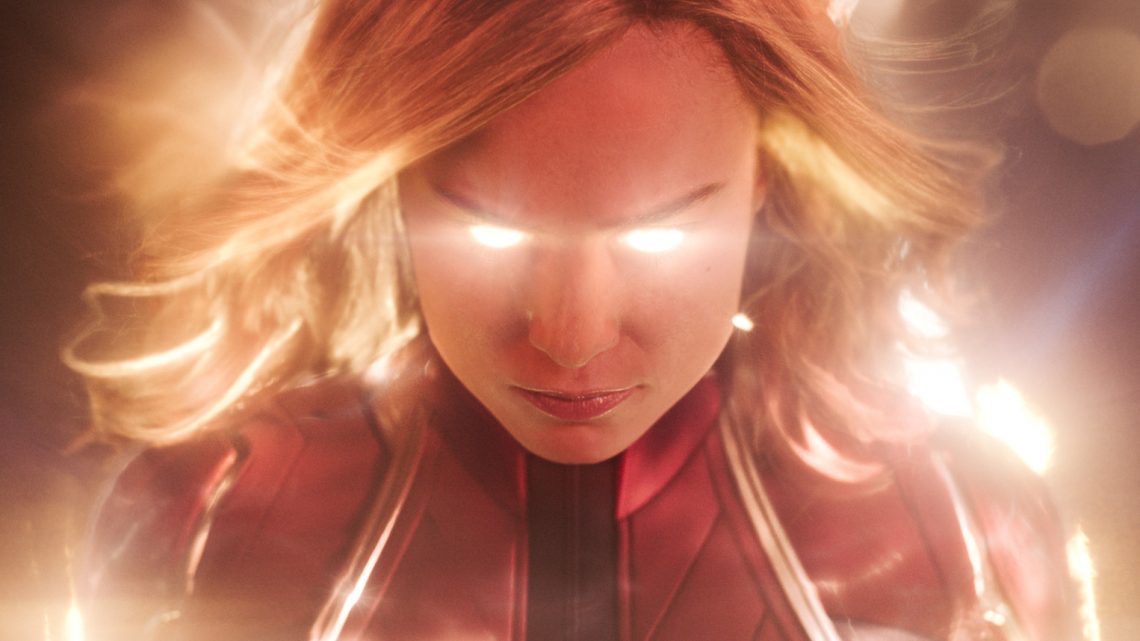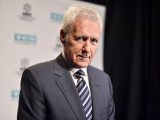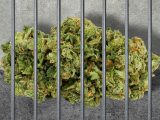
‘Captain Marvel’ Is the MCU’s Most Predictable Film
March 7, 2019After 20 Marvel films—yes, you read that right—eight of which can be considered origin stories, it’s easy to notice the predictability of the Marvel Story Formula. MCU films open with a scene embodying the emotional arc, wherein our hero is too puny for the military, or turns green with uncontrollable rage, and so on. There’s a physical conflict of global or intergalactic scale, usually instigated by a rogue villain with confusing motivations. The hero’s perspective is seriously altered after he, say, fails to save Gwen Stacy or he realizes he’s been dealing weapons to warmongers, and in losing everything the hero’s full potential is triggered. This formula is part of the reason we watch Marvel movies the same way we karaoke to Journey or beat a single favorite pair of shoes to shit.
It’s also the reason Marvel’s origin stories tend to be their most dull—without the added intrigue of more than one hero, the formula becomes fully, nakedly obvious. Captain Marvel does not deviate from this formula. The film follows Carol Danvers, a Kree soldier in a war against Skrulls, a race of shape-shifting lizard people-aliens who are slowly taking control of each planet across the universe. Her commander is the rather cloying, militaristic dudebro Yon-Rogg (Jude Law), who tells her the key to controlling her powers is by containing her emotions. Given Danvers powers radiate from her arms, it’s a little hard not to think of her as a tactical version of Frozen’s Elsa, or Scarlet Witch, or literally any woman ever, who's been categorized as overtly emotional and encouraged to tamp down her feelings in service of "gaining more control." It's the same misogynistic critique that women hear every day—power comes with pragmatism, and feelings will get in the way.
Captain Marvel a.k.a. Carol Danvers is haunted by the loss of her memory—the audience already knows she’s an Earth dweller, but she has no recollection of her past—and the film is largely motivated by the mystery of her real identity. She finally finds herself on planet Earth—or C-53 as the straight-faced Kree call it—in the year 1995, after a Kree extraction mission has gone awry and launched her into the urban metropolis of Los Angeles. More precisely, she crash lands in an old Blockbuster Video and then steals comms equipment from a nearby Radio Shack. On Earth she decides to track down scientist and former colleague Lawson (Annette Bening) to find an essential “energy core,” which ends up being one of the key Tesseracts in the larger Avenger’s story. (The film also delves into the founding of S.H.I.E.L.D. and Agent Nick Fury’s lost eye.)
This Earthbound segment is the film’s strongest portion. Captain Marvel’s 90s panache is immediately identifiable and decidedly delightful, bursting with witty cultural touch points and a heavy—but not unwelcome—dose of nostalgia. There are internet cafes, CD-ROMs, pagers, and overlong loading screens—all laughably poor technology compared to Kree’s advanced communication devices. It all has a distinctly 90s LA feel, aided by shots of the city’s urban sprawl, vistas of California high desert, and fight sequences on the LA Metro (which began running in 1993). The soundtrack is plied with punk girl anthems—Garbage’s emo bop “Only Happy When it Rains” and, of course, No Doubt’s “I’m Just a Girl.”
But when the film deviates from Earth, it falls back too hard on Marvel-generic visual language. The Kree civilization is made up of sexy steel and curved spacecraft, a ubiquitous Marvelized science fiction imagining without a particular personality. Ben Mendelsohn's pathos-laced performance of Skrull leader Talos saves the species from being reduced to sheer caricature. But it’s a far cry from Marvel’s typical world-building that usually makes each respective superhero story really sing. In the best Marvel films these details are as powerful as the heroes themselves—think of Black Panther’s ubiquitous vibranium or the mohawk activated arrow from Guardians of the Galaxy.
Captain Marvel’s super suit also gets hardly any backstory, despite the MCU’s established history of giving every hero costume A Moment. Peter Parker’s development as a superhero is tied intimately to his suit’s ability to shoot web, T’Challa’s costume creates explosions from the power it consumes, Dr. Strange’s cape literally harasses him, and Thor’s hammer is tantamount to his identity. Iron Man is literally an entire movie about a costume. Captain Marvel’s sleek Kree designed suit adapts to water and outer space, protecting its wearer with a mohawk topped helmet—but none of this is explained. She’s already wearing it at the start of the film.
Her costume’s Moment is instead about the selection of new colors, which viewers already know—from the promotional posters, and also because this is Marvel—are the colors of American patriotism. This focus on the suit's aesthetic rather than function reads as weirdly gendered. And it reminds us that the look of a woman's costume still takes priority, even if we've moved past revealing getups of superheroines past.
It all puts a lot of pressure on Brie Larson to perform her character with nuance, despite not having much of any backstory or a colorful galactic world to fall back on. Danvers has both no formative memory of growing up on Earth, and the film doesn’t supply much by way of Kree culture she’s adopted while living on Hala (the Kree’s home planet). While the film’s main conflict allows Larson the space to portray wit and empathy, the majority of her screen time is spent performing grit and resilience around a constant undercurrent of mild confusion. She does great work with what she's been given, giving Danvers a classic cool girl swagger that's well tempered by quick dialogue and excellent rapport with Samuel L. Jackson, in his usual role of Agent Nick Fury. (The CGI used to anti-age Jackson is almost terrifyingly seamless.)
The moment Carol Danvers fully emerges as Captain Marvel is fairly standard Marvel fare, infused with a montage of girlhood that reads a little like a Dove commercial. It’s fun in a predictable sort of way, suggesting a version of female empowerment where overthrowing pedantic men is a tool of heroic development, rather than an activity women do on a daily basis. It doesn’t take away the sheer fun of seeing a fully fledged Captain Marvel wreck her enemies with some of the most amazing superpowers in the MCU, which includes an epic romp where Danvers destroys entire space fleets. But it does leave her character feeling underdeveloped—especially compared to her male counterparts’ varied and sophisticated origins which include everything from the loss of a beloved career and fine motor control, to losing a father figure and sticking to walls.
It all ultimately points to the greater flaw in the Marvel franchise, one that might be too late to fully correct—namely that there are so few women in the MCU. The existing heroines don't have the same variance of personality, origin story, or character development as the heroes. It's not until three women are in the same room in the MCU that they finally have different personalities. Guardians of the Galaxy’s Gamora and Nebula are a foil to Mantis’s powers of empathy; the strength of Black Panther’s Okoye and the Dora Milaje are a foil to Shuri’s humor and technological wit and Nakia’s deeply felt humanitarianism. The core Avenger’s team has few women and they're all vaguely similar—deeply powerful, with a backbone of steel and prone to withholding their emotions. Scarlet Witch and Black Widow both fit this bill, as does Captain Marvel, though she’s the most powerful of the group and the only one to get her own movie. Valkyrie and The Wasp are two notable exceptions—both debuted in the last two years and are non core-Avengers team characters.
With Avengers: Endgame right on our tail, we'll finally get to see these superheroines working in tandem. Hopefully Carol Danvers will be given space to truly flourish as a complex, fully realized superhero, rather than simply an idea of extreme female power. For now, Captain Marvel, serves as a mildly progressive but ultimately safe film that feels too much like a prequel to (hopefully) better MCU stories.
Sign up for our newsletter to get the best of VICE delivered to your inbox daily.
Follow Nicole Clark on Twitter.


